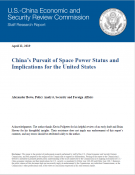
China seeks to become an international leader in space, or what it terms a “space power in all respects.” In this role, Beijing aspires to lead international space-related innovation and exploration and establish an advanced system of infrastructure to serve its space sector. China has suffered some setbacks on projects crucial for the progression of program milestones, such as its heavy-lift launch vehicle program, and still lags behind the United States in its human spaceflight and space station program. Nevertheless, China’s space program is a source of national pride, and its consistent high level of political support and funding ensures progress toward establishing itself as a space power. In 2003, China joined the United States and Russia as a member of the exclusive group of countries to have conducted human spaceflight, and since then it has nearly completed a new, rival global navigation satellite system (GNSS)—set for completion in 2020—and demonstrated its willingness to undertake high-risk, high-reward missions, as reflected by its historic landing on the moon’s far side in 2019. China is likely to achieve future milestones in areas where it is lagging behind international standards on shorter timetables than when the United States accomplished similar missions. This report examines China’s space goals and national space strategy; its progress toward those goals, including an examination of China’s progress in its advanced launch vehicle, long-term crewed space station, and lunar exploration programs; and the primary entities involved in setting and implementing its space policy. Finally, the report assesses the implications of China’s space program for the United States and its continued leadership in space.
